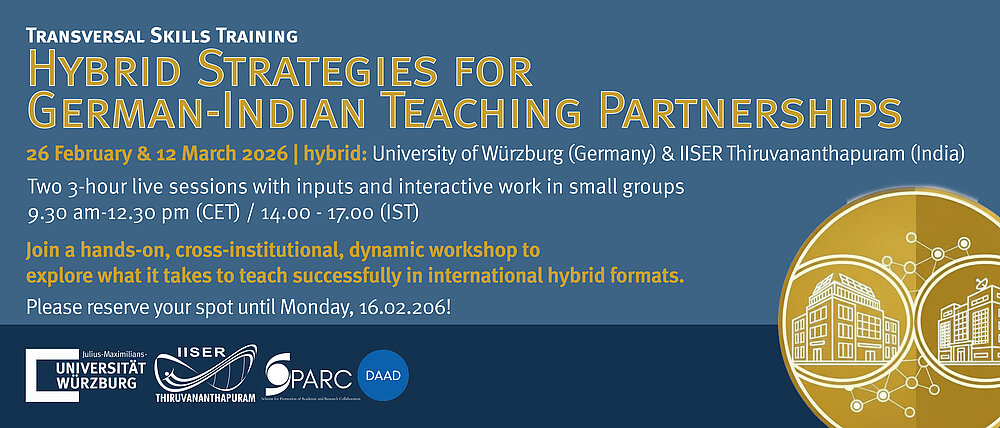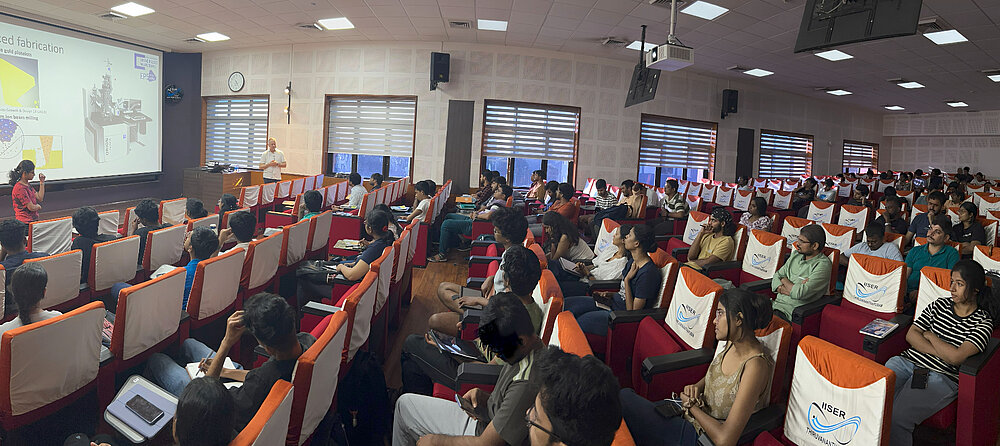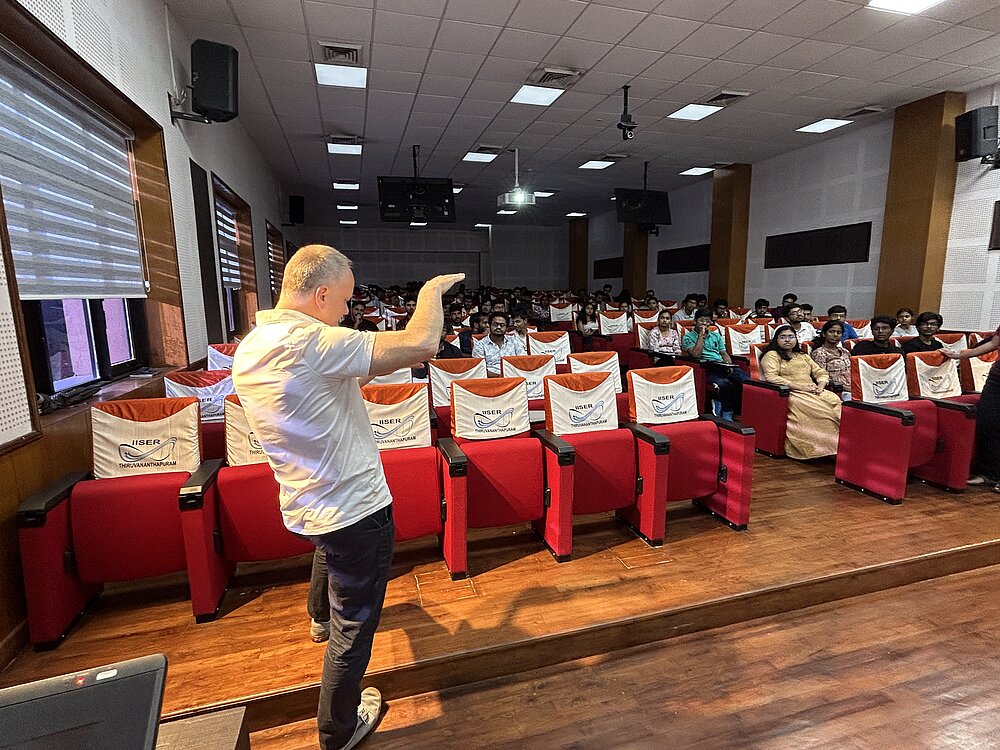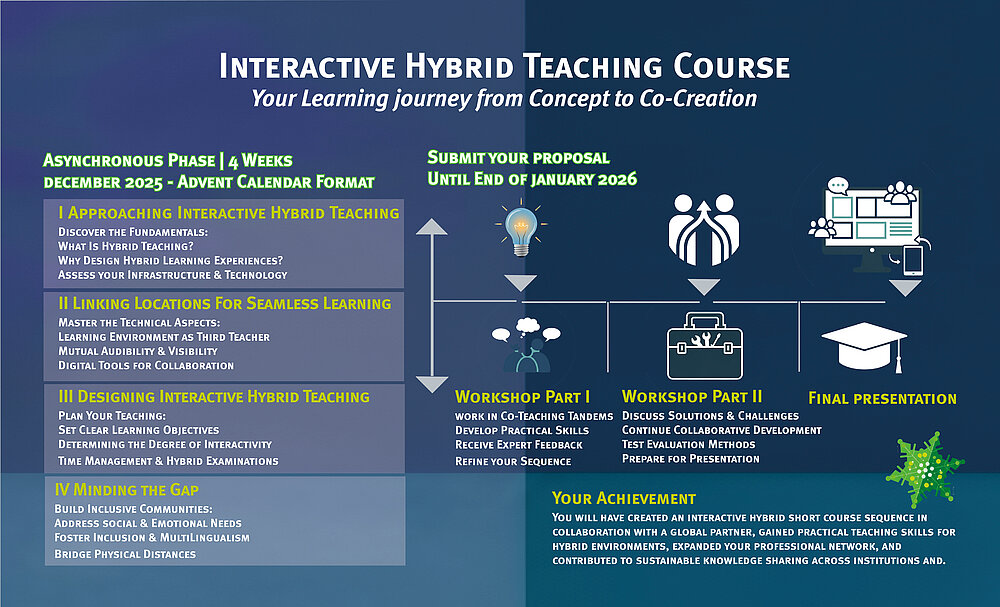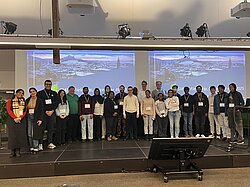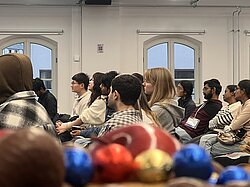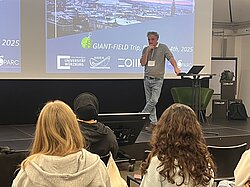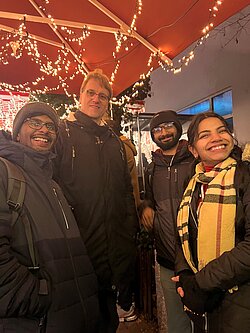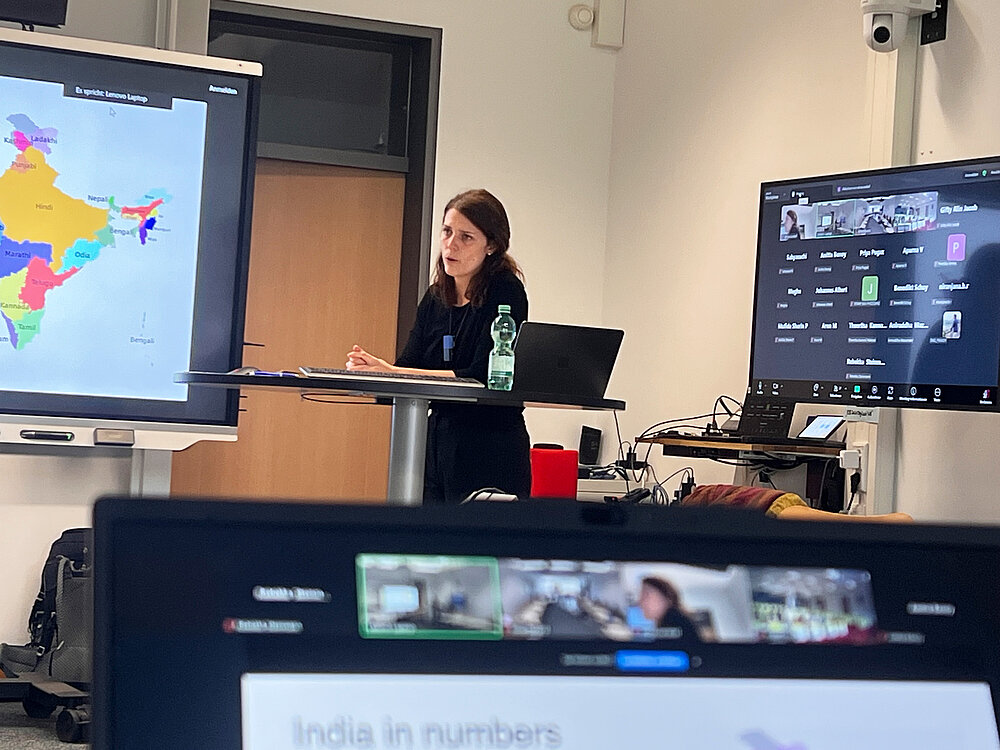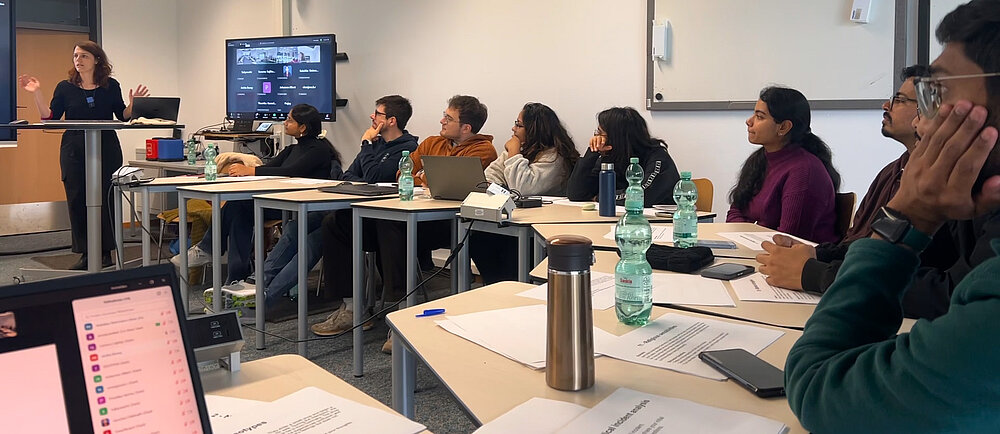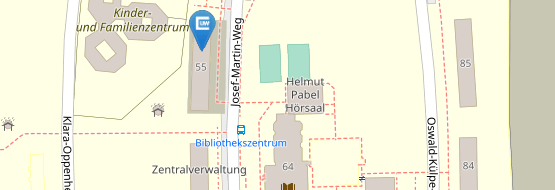Events
Hybrid teaching –the simultaneous teaching of students located in a physical classroom and those joining online – is becoming increasingly relevant, especially in the context of transnational higher education. But what does good hybrid teaching look like? And how can we ensure that all learners—online and on-site—feel equally involved?
In this interactive two-part workshop, you will build co-teaching tandems, explore key concepts and tools for hybrid teaching, reflect on your own experiences, and develop a hybrid teaching scenario for your own course.
What to expect
During the workshop, participants will:
- Explore key concepts and models around hybrid teaching and learning
- Discover tools and strategies for creating engaging and inclusive hybrid learning environments
- Collaborate with peers from University of Würzburg/IISER-TVM in interactive breakout sessions and find partners for joint projects
Who should attend
Higher education teachers (Professors or their delegate postdoctoral researcher or PhD student) who teach and conduct research in the field of STEM and aim to deliver course work in global partnerships in an interactive hybrid format.
Workshop Format
- Two 3-hour live sessions with inputs and interactive work in small groups:
- Part 1: 26 February 2026, 9.30 am-12.30 pm (Central European Time) / 14.00 - 17.00 (India Standard Time)
- Part 2: 12 March 2026, 9.30 am-12.30 pm (Central European Time) / 14.00 - 17.00 (India Standard Time)
- Hybrid participation: Join either on-site at University of Würzburg (Germany) at IISER-TVM (India) or online
- Language: English
- Short preparation task & short reflection activity between sessions on OpenWueCampus
Dr. Daria Dydzinskaya
 studied public administration at Lomonosov Moscow State University and holds a PhD in political science with a focus on education. She has been managing projects aimed at higher education development and international academic cooperation for 12 years and has gained extensive experience in project conception, application, implementation and evaluation at national and international level. Inter-university and international training events, conferences and meetings have always been an important part of the projects. Her interest in project management in higher education, public education policy, international educational and scientific cooperation and academic exchange motivated her to become involved in the Netzwerk Hybride Lehre at Humboldt-Universität zu Berlin.
studied public administration at Lomonosov Moscow State University and holds a PhD in political science with a focus on education. She has been managing projects aimed at higher education development and international academic cooperation for 12 years and has gained extensive experience in project conception, application, implementation and evaluation at national and international level. Inter-university and international training events, conferences and meetings have always been an important part of the projects. Her interest in project management in higher education, public education policy, international educational and scientific cooperation and academic exchange motivated her to become involved in the Netzwerk Hybride Lehre at Humboldt-Universität zu Berlin.
Dr. Natalia Spitha
 studied Chemistry at Davidson College in North Carolina, USA. She completed her doctoral studies in Materials Chemistry at the University of Wisconsin–Madison, during which she pursued professional development in teaching and learning as well as projects in curriculum design and chemistry education research. Since moving to Germany in 2022, she has conducted research on simulation-based learning in university-level chemistry courses and developed resources and workshops for educators on the topics of hybrid and online teaching.
studied Chemistry at Davidson College in North Carolina, USA. She completed her doctoral studies in Materials Chemistry at the University of Wisconsin–Madison, during which she pursued professional development in teaching and learning as well as projects in curriculum design and chemistry education research. Since moving to Germany in 2022, she has conducted research on simulation-based learning in university-level chemistry courses and developed resources and workshops for educators on the topics of hybrid and online teaching.
Contact
If you have questions or concerns don’t hesitate to contact us at rebekka.steinmann@uni-wuerzburg.de (Rebekka Steinmann, University of Würzburg) or santosh.roy@iisertvm.ac.in (Dr. Santosh Roy , IISER-TVM).
Data protection is particularly important to the University of Würzburg, which is why we are happy to fulfil our obligation in accordance with Art. 13 para. 1 of the General Data Protection Regulation and provide you with the following information on the processing of your data.
The controller for data processing is the University of Würzburg, Sanderring 2, 97070 Würzburg, e-mail: info@uni-wuerzburg.de. If you have any questions about data protection, you can contact the University's data protection officer, Sanderring 2, 97070 Würzburg, e-mail: datenschutz@uni-wuerzburg.de.
The personal data collected from you will be used exclusively for the purpose of participation at GIANT events. We are authorised to do so in accordance with Art. 6 para. 1 letter a GDPR. In the event that you participate in hybrid parts of the conference, we would like to point out that we use ZOOM here. You can find more information about ZOOM at: Privacy policy and information on data processing including information from end devices (German only).
Your data will be stored at the University of Würzburg and deleted after the end of the GIANT project.
Further information about your rights regarding the GDPR can be found here: https://go.uniwue.de/betroffenenrechte (German only)
By submitting your data, you declare that you have taken note of the privacy policy and agree to it.
Bitte dieses Feld NICHT ausfülleDatenschutzerklärung und Einwilligung zur DatenerhebungDer Datenschutz ist der Universität Würzburg besonders wichtig, deshalb kommen wir unserer Verpflichtung gemäß Art. 13 Abs. 1 der Datenschutzgrundverordnung gerne nach und geben Ihnen folgende Informationen zur Verarbeitung Ihrer Daten. Verantwortlicher für die Datenverarbeitung ist die Universität Würzburg, Sanderring 2, 97070 Würzburg, E-Mail: info@uni-wuerzburg.de. Für Fragen des Datenschutzes können Sie sich an den behördlichen Datenschutzbeauftragten der Universität, Sanderring 2, 97070 Würzburg, E-Mail: datenschutz@uni-wuerzburg.de wenden. Die von Ihnen erhobenen personenbezogenen Daten werden ausschließlich zum Zweck der Teilnahme an den Veranstaltung im Rahmen des GIANT Projektes genutzt. Hierzu sind wir nach Art. 6 Abs. 1 Buchst. a DSGVO berechtigt. Für den Fall, dass SIe an hybriden Teilen der Konferenz teilnehmen, machen wir Sie darauf aufmerksam, dass wir hier ZOOM nutzen. Nähere Angaben zu ZOOM finden Sie unter: Datenschutzerklärung und Information zur Datenverarbeitung einschließlich Informationen von Endgeräten. Ihre Daten werden an der Universität Würzburg gespeichert und nach Projektende gelöscht. Weitere Informationen über Ihre Rechte bezüglich der DSGVO finden Sie hier: https://go.uniwue.de/betroffenenrechte Mit dem Absenden Ihrer Daten erklären Sie, dass Sie die Datenschutzerklärung zur Kenntnis genommen haben und damit einverstanden sind.
The research area Functional Nanosystems – Materials Chemistry (FN-MC) invites to the live broadcast of a three-part lecture series presented by Prof. Dr. Frank Würthner at IISER-TVM, hosted at the Center for Nanosystems Chemistry.
Lecture 1: 27/10/2025 Functional Nanosystems 1: Supramolecular Engineering of Light Energy Converting Nanosystems
Lecture 2: 28/10/2025 Functional Nanosystems 2: Supramolecular Engineering of Photoluminescent Nanosystems
Lecture 3: 29/10/2025 Functional Nanosystems 3: Supramolecular Engineering of Nanographene pi- and Anion Receptors
Indian Time 6:30 PM (German Time 2:00 PM) to Indian Time 8:30 PM (German Time 4:00 PM)
Interested guests may contact the organizer via the registration form below.
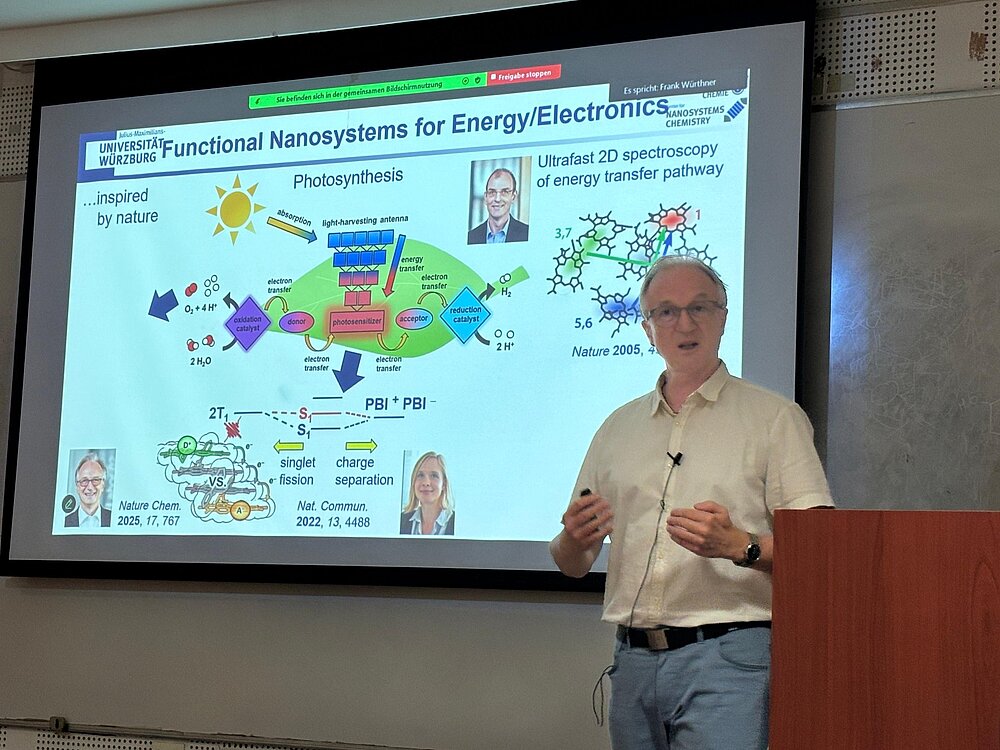
Prof. Bert Hecht, chair of the Nano-Optics & Biophotonics group, Experimental Physics 5, University of Würzburg delivers a three-part lecture series at the School of Physics, IISER-TVM from 7.11.2025 - 11.11.2025.
High-end plasmonic nanostructures: Forces, strong coupling, nonlinearities
Friday, 7. November 2025, 3:30 PM, IISER-TVM, School of Physics Seminar Hall
Abstract: The precision afforded by He-ion beam milling on monocrystalline gold and silver flakes presents an opportunity to tailor local fields at an unprecedented level of 1 nm. This method enables the fabrication of intricate structural details, which can be used to create nanoresonators and antennas with unique properties. We leverage these capabilities to create devices that exhibit local symmetry breaking, ultrasmall mode volumes, and precise chiral scattering. The lecture will introduce some basics of plasmonics and fabrication, and then progress towards more applied topics.
References
- Meier, J., Zurak, L., Locatelli, A., Feichtner, T., Kullock, R. and Hecht, B. “Second harmonic generation from plasmonic hotspots by controlled local symmetry breaking,” Adv. Optical Mater.,11, 2300731 (2023). https://doi.org/10.1002/adom.202300731.
- Groß, H., Hamm, J. M., Tufarelli, T., Hess, O. & Hecht, B. “Near-field strong coupling of single quantum dots,” Science Advances 4 (3), eaar4906 (2018). https://www.science.org/doi/10.1126/sciadv.aar4906
- Wu, X., Ehehalt, R., Razinskas, G. Feichtner, T., Qin, J. and Hecht, B. “Light-driven microdrones,“ Nat. Nanotechnol. 17, 477–484 (2022). https://doi.org/10.1038/s41565-022-01099-z
The GIANT project at the University of Würzburg invites higher education teacher and young scientist to explore hybrid interactive teaching in the format of an advent calendar, starting on December 1st, 2025. Participants entering this seasonal journey get access to audiovisual content centering around hybrid interactive teaching day by day, until December 24th.
Registration for this highly innovative teacher training format is via self-enrollment on OpenWueCampus: https://openwuecampus.uni-wuerzburg.de/moodle
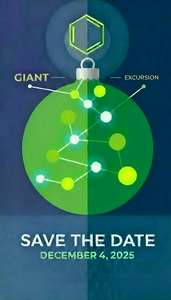
On Thursday, December 4th, we step out of the lab and into the world of entrepreneurship, knowledge and technology transfer.
Departure: 12:15 PM, Parking Space at Building Z6
14:00 Welcome & Tour, Dr. Sebastian Engel@Zollhof Nuremberg
Confirmed speaker:
Prof. Lukas Worschech, GIANT JMU Project Coordinator
Christoph Heynen, Friedrich-Alexander-Universität Erlangen-Nürnberg, S-OUTREACH – Outreach Support
Matthias Trost, CEO, FAU Start-up Amperial Technologies GmbH
Dr. Mikhail Antonkin, Bavarian Research Alliance (BayFOR)
18:00 End
~ Evening at the Nuremberg Christkindlesmarkt ~
Retour to Wuerzburg: 21:30
Further details will be successively added.
Please make sure to RSVP!
Contact: rebekka.steinmann@uni-wuerzburg.de
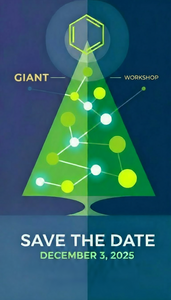
Wednesday, 03.12.2025, 13:00 -17:30, the Center for Nanosystems Chemistry hosts a Scientific Workshop at the Center for Nanosystems Chemistry where GIANT guest students, professores and co-workers have the chance to meet, discuss their experience and present the research project they have been working on at JMU.
A Christmassy coffee break will hopefully provide a nice opportunity to mingle and exchange before the first GIANT interns at JMU return to India, end of December.
For questions concerning the Scientific Workshop, please get in touch with Dr. Yvonne Wagenhäuser, member of Prof. Frank Würthners team at the Institute of Organic Chemistry.
Date: 17.10.2025
Duration: 10:00 - 15:00, participants are warmly welcome to join us onsite for coffee and a chat from 9:30 on and stay for networking afterwards
Format: hybrid / interactive
Contents:
- General introduction to intercultural communication / aims of the workshop
- Warm up Exercise: typical challenges
- Short presentation: Indian culture / German culture
- Group discussion on case studies / scenarios
Trainer Anna Scarabel, M.A., member of JMU’s India Competence Centre



